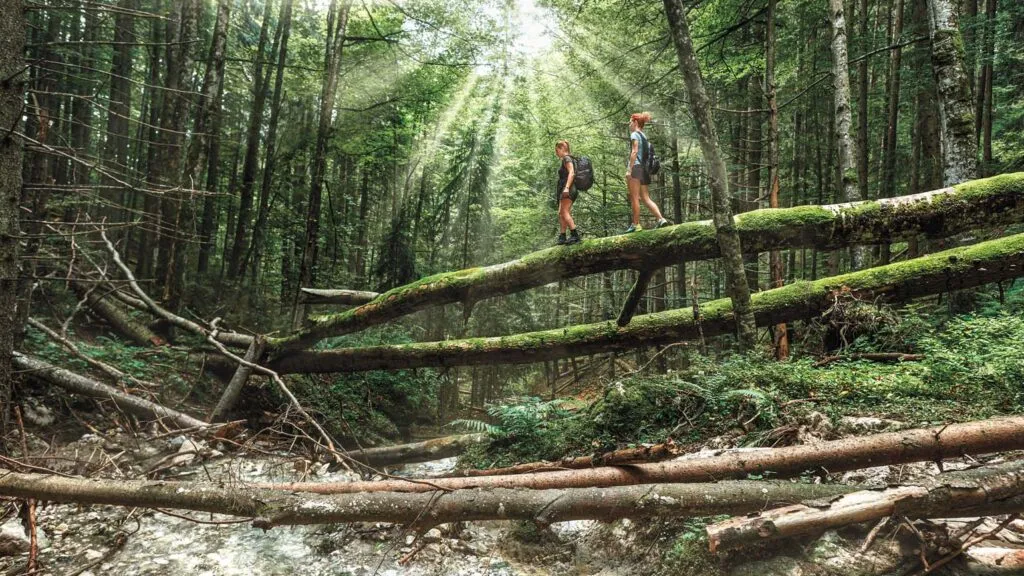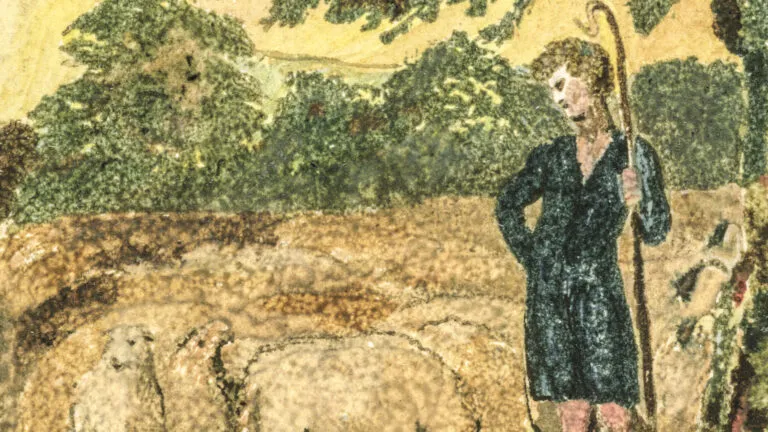Every summer growing up in Richmond, Virginia, my family picked the wild blackberries that grew in the woods near our house. The summer I was 15 years old, I plucked a perfectly ripe berry off a bush. All at once, I was struck by a profound sense of wonder at the very perfection of that little fruit. I marveled at its seemingly miraculous ability to grow from the earth and nourish me. I experienced the startling awareness that everything around me was balanced and correct. Each aspect had a purpose: the sky, the trees, me, even this tiny blackberry I held in my hand. It was as if the world itself had suddenly come into divine focus. Then I heard my mom calling and the moment ended.
The experience left me with a persistent question: Why did that moment in the woods make me feel more connected to God than any other moment in my life?
I turned to Scripture. The Book of Genesis describes how God created the lands, the oceans, the vegetation and the wildlife before creating humans, as if he were setting the stage for us, the natural context of our existence. The Book of Job in particular focuses on how God’s power can be seen in every aspect of nature, from mighty storms to the morning dew. When Jesus needed to pray, he often retreated into nature. In the Book of Mark, Jesus went to the mountains. In the Book of Luke, he went to the hills. In the Book of Matthew, he went to a garden.
I also turned to mystics and theologians. In his poem “When I Was the Forest,” Meister Eckhart talks about returning to nature to feel God’s presence. Saint Francis of Assisi believed communing with animals could draw us closer to God.
Still, I wondered about modern cases, like mine, in which nature served as a connection to something more.
I spoke with Paul Marshall to get a better understanding of current revelatory moments in the natural world. Dr. Marshall studied natural sciences at the University of Cambridge and received his MA and Ph.D. in religious studies from Lancaster University. He’s dedicated his career to the study of extrovertive mystical experiences, or mystical experiences in nature.
Dr. Marshall has found that experiences like the one I had often leave the experiencer with a shift into a deeper center of self and a sense of divine presence or a higher power.
“Mystical experiences have been viewed as the purview of a few saints and other holy personages,” Dr. Marshall told me, “but it’s clear that they’re much more common than we think.” He pointed to a 2000 study out of the UK that polled people who’d had a mystical experience. Twenty-nine percent of the respondents reported their experience as “awareness of a sacred presence in nature.”
His research also revealed that these profound moments are experienced by people of all faith backgrounds, levels of belief and age—as if the natural world is a spiritual access point that God has made available for all.
Even if a person doesn’t have a dramatic shift in spiritual perspective, nature can still be the setting for important communion with God, giving us answers to life’s greatest challenges.
Nature held the answers that Colleen Messina, of Bozeman, Montana, urgently sought after her father was diagnosed with Alzheimer’s. Colleen felt she was losing her connection to him. Her father refused to discuss his condition, and she struggled to know how he was feeling.
“The person I loved most in the world was disappearing, and I couldn’t talk heart-to-heart with him anymore,” she told me.
Colleen and her father had always connected through hiking. She found a short hike they could do near their home. It led to the top of a hill where they paused to catch their breath and marvel at the sweeping views of the verdant valley below. Above them a hawk soared on a thermal. The sun warmed their shoulders.
“Looking all around me—the pines, the rocks, the big sky—I felt the full presence of the Holy Spirit and suddenly knew the words I needed to say.”
Colleen spoke softly to her father. “Daddy, how is your heart?”
“My heart is fine,” he answered, then smiled. “My home is my heart. I am at home.”
Colleen found emotional healing and spiritual reconnection on the hilltop that day.
Indeed, nature can be a place where people find healing of all kinds. According to a 2016 article by Time magazine, a series of studies in Japan showed that nature can be beneficial to our physical health as well. The Forest Agency of Japan even recommends that people take the time to walk in the woods for their health, a practice called shin-rin-yokurin-yoku, or “forest-bathing.” Studies , conducted by Qing Li, one of the world’s leading experts in forest bathing, found that the practice can lower our blood pressure and improve our immune system. Dr. Li’s research also shows that it can help ease depression, reduce anxiety and anger, and increase energy.
Yet what is it about nature, specifically, that lends itself to these experiences? Why couldn’t my revelation, or Colleen’s healing moment, have happened at home, at work or even at church?
According to Laurie Kehler, author of the book This Outside Life: Finding God in the Heart of Nature, we are manifestly part of God’s creation. Kehler has spent her life in the great outdoors and believes it is in this space that communion with God comes easiest.
“When we started, we started in a garden,” she said. “God designed nature to speak to us. That’s why we feel his presence so much there. That was the first way he communicated with us.”
She describes how nature is intel-ligently designed to elicit wonder, something that is vital to our faith.
“What I learned being 50 feet underwater scuba diving in Australia or being at the top of a mountain in Yosemite is that God did not have to do this,” she says. “He could have made all the fish gray and functional, but he didn’t. He could have made all the birds blue, and all sing the same song, but they don’t. He made them all amazingly varied in their colors and their habits. I see this creativity in nature as his love being poured out.”
It’s that sense of awe and wonder that leads to experiences like the one I had, says Dr. Marshall. The mountains, the sea, the forest and the night sky are all rich settings for mystical experiences. “They can take one out of oneself with the calming sounds, arresting fragrances and the quiet of mind that these settings can instill.”
With hectic schedules, fast-paced environments and people spending more time in front of screens, experiencing nature is more important than ever to renew our spirit and connect to the divine.
“In the short term, the experiences can help people through difficult periods in their lives,” says Dr. Marshall. “In the longer term, they can encourage a spiritual reorientation. They can increase sensitivity to social and environmental issues—the care of other living beings in general. It is important to recognize that the experiences are not ends in themselves but invitations to look deeper.” In other words, a vibrant pathway to spiritual growth, balance and harmony.
I was imbued by that feeling during my experience in the woods. I looked at that blackberry and felt a deep sense of wonder. My perspective on the world wasn’t so much changed as realigned. As if my soul had been awakened to the purest form of God’s love for us: the very world he created. God is too big, too wondrous, for us to fully understand, but that moment in the woods near my home helped me feel closer to him than I had ever felt. The feeling lingers still.





